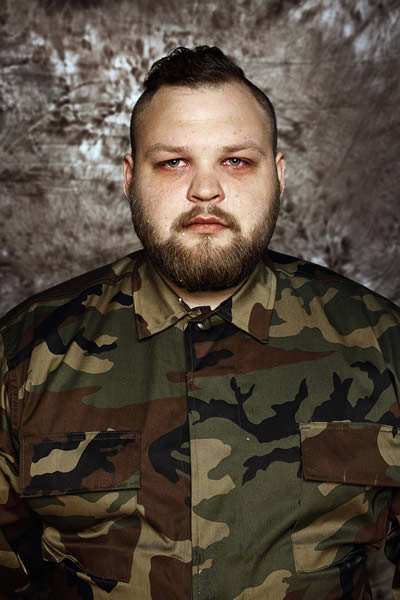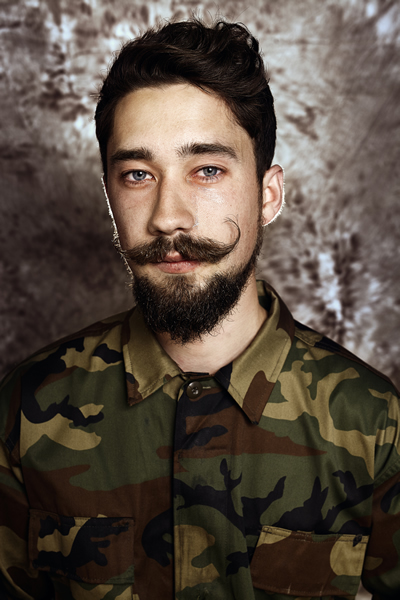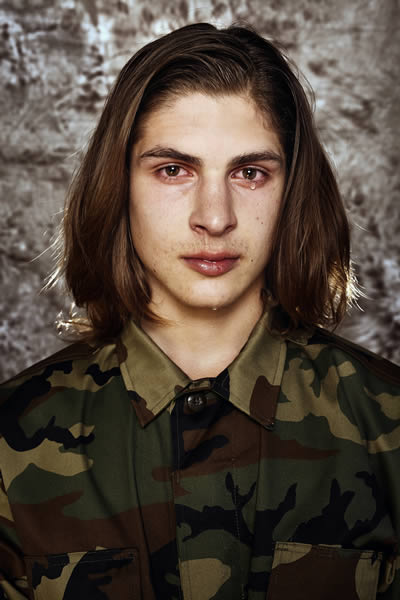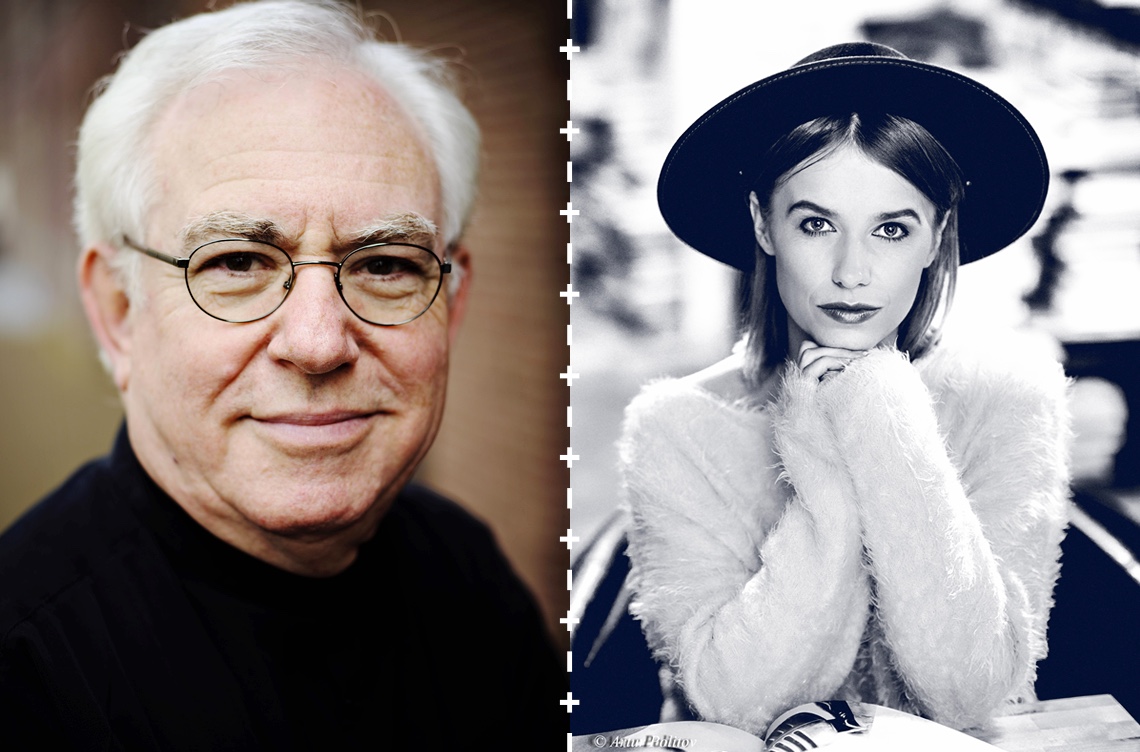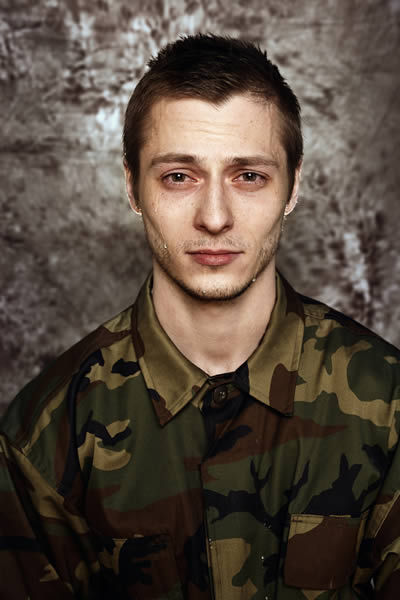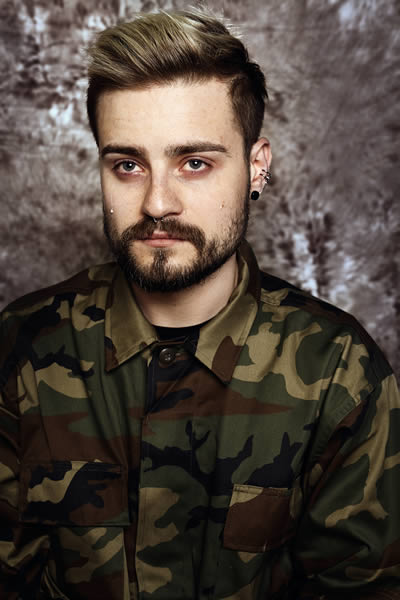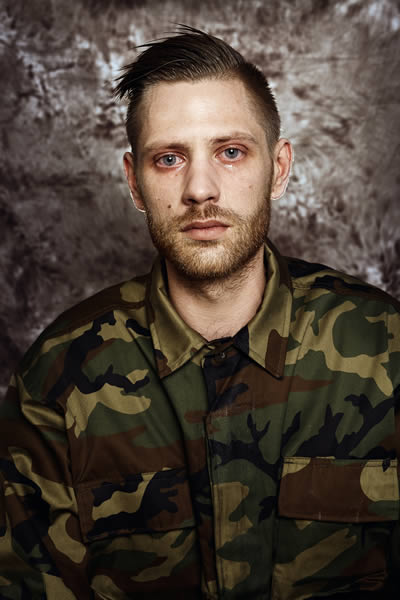Misha FurmanMisha Furman (67) was five years old when the KGB came to his door. The secret agents ransacked his home, found a number of books in Hebrew, and took his father. He was sentenced to ten years in prison. Because he used to be a member of a Jewish association when he was younger.
From that moment, he and his mother had to fend for themselves. “I saw my father once or twice, from a distance and through bars. That's it”, says the short, quiet Lithuanian in his Rotterdam home. “He was transferred to Russia, to a prison near the Volga River. I couldn't visit him there.”
Still, Neringa fears Russia. And she's not the only one. “Fear of Russia is widespread in our country, so much so that it becomes a part of you. Everyone talks about it”, Neringa says – straight blonde hair, intense look – via Skype. And she's not only referring to uneducated elderly people, but to her own generation just as well. “That includes my friends who have seen the world and whom I respect. Especially when Russia 'makes a move', like execute military drills near the Lithuanian border or fly through Lithuanian airspace, it's the talk of the town and mass hysteria takes over.”
To be fair, Lithuanian history is riddled with foreign oppressors. “Long ago, in the 14th or 15th century, our country was rich and wealthy. But we've been oppressed by someone or other ever since. Be it the Swedes, the Germans, the Russians, whoever. Everyone just barged right in. It's no wonder fear of occupation and oppression is in our genes.”
BUGGING DEVICES
Misha FurmanThey barely talked about the Soviet system at Misha's. “You had to be careful at all times”, he remembers. If he and his family visited friends, everything was unplugged, including the phone. In case they were bugged. Sometimes they received a letter from his father in prison, but most of it was crossed out with black marker. Only positive news remained, we had no idea how he was really doing”, Misha says.
Times were tough for his mother. She had to work in a yarn factory to take care of herself and her son. Misha remembers the long lines to buy a kilogram of flour. “We had next to nothing. There were even little kids who were willing to stand in line with you for a dime. It gave you the right to an extra bag of flour.”
Looking back, Misha doesn't think he fully grasped what was going on. It turned out his neighbor and playmate was the son of a KGB officer. “I later realized my mother handled that exceptionally well.” But when Misha accidentally hit his neighbor in the head with a pebble, resulting in a bloody trip to the hospital, his mother panicked. “Thankfully, nothing happened. My mother apologized politely, and that was that.”
CRYING SOLDIERS
Neringa Rekašiūtė The confrontation with the Russians suddenly became very real when last spring Neringa's partner received a letter. He will join the army in September. He has to. Days after the letter, more and more friends called: they, too, had received the letter. By the end of summer they'd be soldiers, while now they were having careers. Some just had their first child.
NATO military executes fighter jet drills to support Baltic states.New York Times news article of June 13, 2015: US poised to send heavy weaponry to Baltic States.
Early this year, for fear of the Russians, Lithuanian government reinstated the draft for all men aged 19 to 27. After annexation of the Crimea and the streak of violence in Ukraine, the government decided they had to prepare themselves for a possible attack. NATO was asked to dispatch three thousand men. Although an air or land war with the Russians seems unlikely, NATO has regular drills with fighter jets, because Russia is just too unpredictable.
And it was recently announced the United States are considering sending heavy weaponry to the Baltic States, which would be the first time since the Cold War ended.
Neringa is an advocate of the military reinforcement of Lithuania, but strongly opposes the annual 'lottery' that randomly drafts 3,500 men. As a reaction, she made a portrait series titled 'They Won the Lottery' of young men in military outfits, crying. “All of a sudden these boys have to spend nine months of their lives in the army. And if they don't want to, they're considered wimps.” The portraits are meant to convey there's nothing wrong with men showing their feelings, and spark the debate on 'manliness'.
“I was labeled ‘the enemy’ and ‘traitor’ in the country”
And boy, did she know it. Lithuanian media was all over the young photographer: she made it to many a front page and the phone was ringing off the hook because TV stations were dying to interview her. “It was hell”, she says. “I was attacked by anyone and everyone. How dare I criticize the state?” She was labeled ‘the enemy’ and ‘traitor’ more than once.
Neringa believes that this narrow-minded mentality, as she saw it, has lingered from Soviet times. “Lithuanians are still not used to criticism.” But the fear of Russian threat played a part as well, she feels. “We are extremely scared of Russia; we’re afraid criticism on something like the draft won’t be tolerated. For fear that that criticism might be used as Russian propaganda.”
THE VIOLIN
Misha Furman“My father’s whole life was dedicated to giving me a free and good life, away from occupation”, says Misha. During WWII, his parents lost their two sons, aged two and four. They never spoke about it, not when Misha was older, either. He only knows he once had two brothers from some of his parents' acquaintances who were in the same concentration camp. His mother sometimes sang a song from the camp at home, but she never managed to finish it. Misha was a post-war child that was to grow up in freedom. The problem: after the Germans left, the Russians came and a new occupation started.
In Soviet times, Misha's father was a barber. The state required him to cut approximately 200 people a month at 80 rubles a head. Just enough for his family to live on for a week. So Misha's dad did what everyone around him did, too: make money on the side and cut extra people. “I think he had some 500 customers a month”, says Misha.
“The quality of music lessons is the only advantage of the Soviet system”
Misha's father would do everything for his son, which also showed when five-year-old Misha – six months after his father was sent to prison – decided he wanted to play the violin. 'Your son has gone mad', his mother wrote in a letter to his father in prison. A few months later, an envelope with money arrived. His father had been cutting prison wardens, which had earned him some extra cash. 'For your violin' the note said.
Misha's mother bought a violin and Misha started his lessons. They were extremely strict. “It's the only advantage of the Soviet system”, Misha says. “If you wanted to learn how to play the violin, you learned how to play the violin. Not soccer, not judo, only the violin. That's why the best musicians are from Eastern Europe.”
Then, after a year and nine months, something entirely unexpected happened: Misha's father came home. “It was a moment I will never forget. We celebrated like there was no tomorrow”, says Misha. “They said he was set free 'because of Stalin's error'.” Khrushchev had come to power and pardoned over one million prisoners.
NO POINTS
Neringa Rekašiūtė The renewed Russian threat requires a firm stand against the large neighboring country, Nerigna feels. “I'm happy our president is not afraid to express his sentiments explicitly. And it's a good thing we're reinforcing our military, as it is a clear sign to NATO we're ready to help out if need be.”
But seemingly insignificant signals and protests matter just as well, she believes. She felt proud when Lithuania gave the Russians no points at the Eurovision Song Contest. “That was an historical moment. No points! That had never happened before”, she chuckles.
No matter how rebellious Neringa may seem today, her grandparents were conformists during the Soviet system. “They didn't question anything and behaved as they should”, says Neringa. Her parents are slightly more liberal than her grandfathers and grandmothers, but still did as they were told. With a look of pride in her eyes she talks about one of her mother's rebellious friends, who used to go out in miniskirts and jeans regularly. For that she was arrested more than once.
Her father often tells Neringa he's jealous of her, the way she can travel the world. When he was younger, he got to visit Amsterdam for an exchange program once. That's where he saw the free world for the first time ever. “It made a deep impression on him”, she says.
COCA-COLA AND TOILET PAPER
Misha Furman Since they wanted Misha to grow up in a free world, they had no choice but to leave Lithuania. For thirteen years straight, year after year, their requests for exit visa were rejected. In 1969 their luck turned: they were allowed to leave the country.
On the day of their departure Misha carried a bag of clothes in one hand, and his beloved violin in the other. But upon arrival at the border he was told he couldn't bring his violin. He had to leave it behind. He was devastated.
They boarded a train to Budapest, where they stayed the night. It was the first time in his life Misha saw and used toilet paper. By the time they arrived in Israel Misha felt he was in paradise. “But Coca-Cola didn't do it for me. It tasted like soap, really”, he says.
“But Coca-Cola didn't do it for me. It tasted like soap, really”
After that, things started moving fast for Misha the violinist. He was admitted to the music academy in Israel and played in a string quartet. And then, six months after arriving in Israel, his violin arrived after all. A friend who also came to Israel had smuggled it in his luggage.
Seven years later, in 1976, Misha came to the Netherlands. He was young and wanted to see more of the world. Misha has been living in the Netherlands for almost forty years now, and continued playing until his retirement – for the Rotterdam Philharmonic Orchestra, among others. He still teaches at the Rotterdam Conservatory.
His parents remained in Israel. Misha's father felt at peace there almost instantly. And his mission to have his son grow up in freedom had succeeded.
Lithuania is now a holiday destination for Misha only. He would never want to live there anymore. His stays are spent visiting locations he wasn't allowed to go when he was young, including a stretch of nature that used to belong to the Russians. And he visits old friends and his violin teacher. “They worry”, says Misha. “Who doesn't fear Putin?”
Neringa Rekašiūtė For Neringa, it is vital Lithuania will remain part of Europe, as freedom means the world to her. “Ultimately, I want to live in a country where people trust each other, feel free, and are not afraid to express themselves. Where we no longer live in fear.” But considering the unpredictability of their big bully neighbor, that won't be easy, she thinks.
Would she have been as rebellious as she is now in Soviet times? “Definitely”, she says resolutely. “It's in my veins.” Then, laughing: “But then I would have been thrown in jail a long time ago. Far, far away in Russia.”
